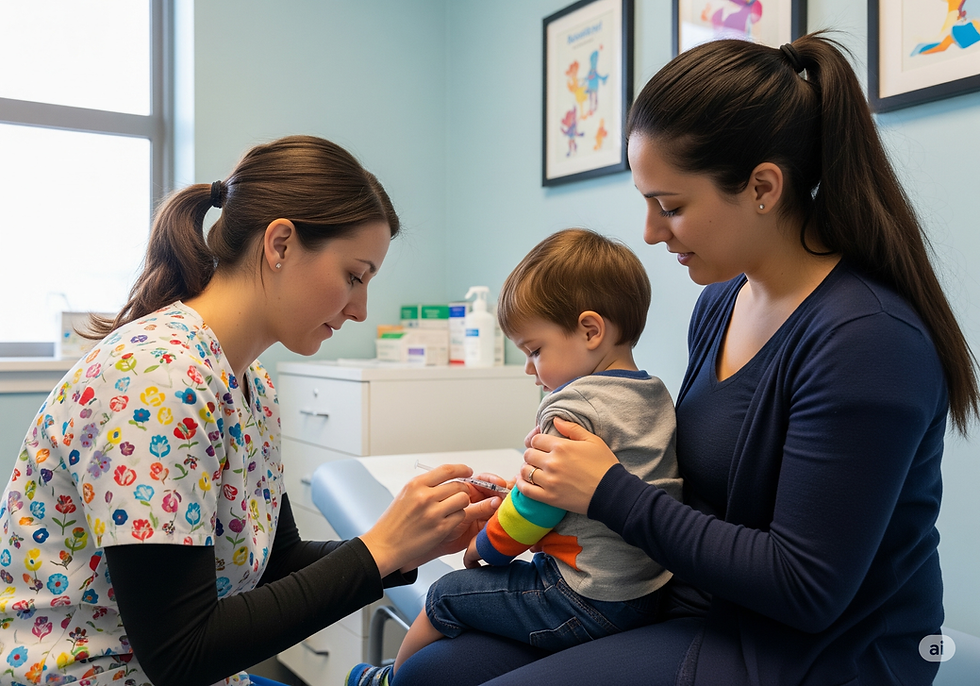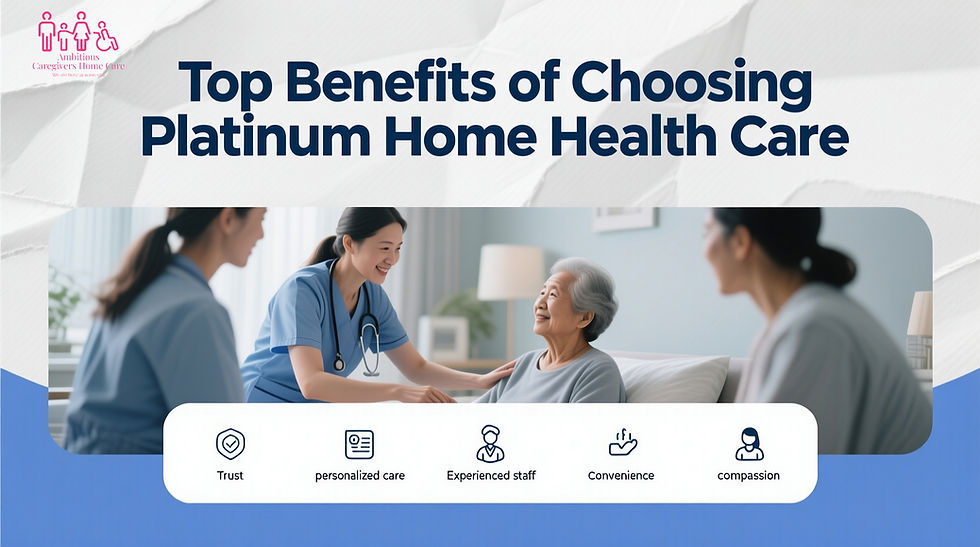GAPP Home Care Services: Nurturing Families with Compassion and Expertise
- ambitiouscaregiver
- Aug 14
- 5 min read
Introduction
Families with children with complex medical needs tend to encounter everyday challenges that transcend what most parents go through. Offering medical care, coordinating therapies, and providing emotional support are things that are not possible to handle alone without the proper help. This is where GAPP Home Care Services become a difference-maker filling in the gap between professional healthcare and family care while remaining at home.
The Georgia Pediatric Program (GAPP) is a Medicaid-funded program created to offer nursing care in the home for medically fragile children up to 21 years of age. GAPP is dedicated to allowing families to keep their homes safe, loving, and medically nurturing without having to constantly be in the hospital.

Understanding the GAPP Program
It's necessary to know its mission before we look into how GAPP operates. GAPP is designed particularly for medically complex kids that need skilled nursing attention above and beyond ordinary caregiving.
Key Benefits of GAPP Home Care Services
Selecting the most appropriate support system for a medically dependent child is a significant undertaking. GAPP provides some unique strengths that make it one of Georgia's most respected care options:
Professional Skilled Nursing
Kids in GAPP care have licensed practical nurses (LPNs) or registered nurses (RNs) assigned to them, who are trained to manage intricate medical conditions. From medications to tracking vital signs, the nurses apply hospital-grade skill directly to the home.
Individualized Care Plans
Each child has a special condition, and GAPP knows this. Care plans are prepared in conjunction with the physician of the child, family members, and nursing staff. This guarantees each component of the home care service is tailored to the specific needs of the child's health.
Family-Centered Approach
GAPP is not just about meeting medical needs; it’s about creating an environment where families feel supported. Nurses often educate parents on how to manage their child’s care, making them confident partners in the process.
Emotional and Social Support
Taking care of a child who is medically dependent can be draining emotionally. Having a professional caregiver at home not only brings comfort but also allows the child to have as much sense of normalcy as possible going to school, pursuing hobbies, and enjoying quality time with their loved ones.
How GAPP Home Care Services Operate
The GAPP program has a straight-forward, systematic process to guarantee that every child receives the proper care:
Eligibility Assessment
Families must initially apply and submit medical records from the child's doctor. The evaluation checks if the child's condition qualifies as skilled nursing under GAPP.
Development of the Care Plan
A detailed care plan is developed once the application is approved. This encompasses the amount of nursing hours a week, certain medical procedures, and emergency procedures.
Assignment of Nurses
A qualified nurse or team of nurses is matched with the child, taking into account medical expertise, location, and family preferences
Ongoing Monitoring
The plan of care is monitored on a regular basis to ensure that the child's needs are being addressed and changes are made as required.
Services Covered by GAPP
GAPP Home Care Services are comprehensive and intended to address both short-term and long-term requirements. Typical services include:
• Skilled Nursing Care: Taking vital signs, giving medications, and conducting medical procedures.
• Medical Equipment Management: Management of ventilators, feeding tubes, oxygen therapy, and other life-supporting systems.
• Therapeutic Support: Consulting with physical, occupational, or speech therapists to assist with rehabilitation goals.
• Daily Living Assistance: Assisting with personal hygiene, mobility, and other activities of daily living that the child might have difficulty with because of their condition.
Through these services, GAPP ensures that children not only survive but thrive in their home environment.
Why Choose a Home Care Service Over Institutional Care?
While hospital care is essential for acute medical situations, it’s not always the best long-term environment for a child. Home care service options like GAPP offer several advantages over institutional care:
• Comfort and Familiarity: Children recover and develop better at home in the comfort of familiar surroundings with loved ones.
• Reduced Hospital Stays: Competent home care can obviate complications that otherwise result in hospitalization.
• Family Involvement: Parents continue to be active partakers in their child's care, becoming more confident and having closer family ties.
• Better Quality of Life: Home care fosters a better-balanced daily schedule, enabling children to partake in education, play, and social activities.
Who Is Eligible for GAPP?
Eligibility is determined both medically and financially. In general, the child should:
• Be younger than age 21.
• Copyright a complicated medical condition that cannot be served without skilled nursing.
• Be certified under Medicaid requirements.
GAPP does not only benefit low-income families if the child qualifies medically, families may still be eligible beyond income, as long as other requirements are met.
Getting the Right GAPP Provider
All home care service agencies are not created equal, even when under the umbrella of GAPP. When choosing an agency, look for:
• Experience: Seek out agencies with demonstrated experience in pediatric nursing.
• Staff Training: Make sure caregivers are constantly trained in both medical treatment and child development.
• Availability: Select a provider with the ability to provide regular scheduling to fit your child's requirements.
• Communication: The provider must maintain open, honest communication with families and doctors.
The Role of Families in GAPP Care
Despite having professional nurses available, families are still at the core of a child's health. Parents and guardians contribute significantly by:
• Tracking day-to-day progress and informing the nurse of changes.
• Integrating training on medical equipment and emergency protocols.
• Empathetic and social interaction that supplements medical treatment.
By working together as a team, nurses and families ensure the child experiences cohesive, holistic, and empathetic care.
Surmounting Typical Challenges
Adaptation to a home care service such as GAPP can be daunting initially. Families generally worry about:
• •Trust: Having another person provide care for a medically fragile child takes time to build trust.
• •Privacy: Getting used to having caregivers in the home might take some adjustment.
• •Scheduling: Scheduling care hours with work, school, and other family activities might mean flexibility.
By having effective communication, being patient, and having the right caregiver, these issues can be handled well.
The Future of GAPP Pediatric nursing Services
As medicine increasingly moves in the direction of patient-focused, at-home care, GAPP pediatric nursing is well on its way to being an increasingly vital tool for Georgia families. New advances in medical technology, telehealth monitoring, and nurse-specialized training should improve the quality and availability of services in the years ahead.
Conclusion
Taking care of a medically fragile child is a journey that demands resilience, compassion, and professional assistance. GAPP Home Care Services provide an all-encompassing, Medicaid-reimbursed solution that incorporates skilled nursing, customized care plans, and family participation all in the comfort of their own home.
Frequently Asked Questions
Q1: What is GAPP?
GAPP is an acronym for Georgia Pediatric Program, which is a Medicaid-funded program offering in-home skilled nursing care to children under the age of 21 with complex medical conditions.
Q2: Is GAPP limited to low-income families?
No. Eligibility is medically determined, not based on income. Families can call a GAPP provider to check if they are qualified.
Q3: How many hours of care can my child have?
It varies depending on the child's medical condition and care plan the physician and GAPP staff have developed.
Every family deserves care that’s thoughtful and personal. Ambitious Caregivers is here to walk with you every step of the way.
📞 Call: (470) 545-0385
📧 Email: Services@ambitiouscaregivers.com
Let’s talk about what your loved one truly needs.



Comentários